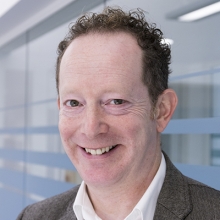Daniel Glaser is the Director of Science Gallery London at King’s College London, which connects art, science and health, driving real innovation in the heart of the city.
Daniel is a neuroscientist by training and joins King’s from the Wellcome Trust where he headed up their engaging science work. He was the world’s first scientist in residence at an arts institution at the ICA in 2002 and was the first scientist to judge the Man Booker prize in 2014. He writes a weekly column in the Observer Magazine.
He recently gave a sparkling and important talk on helping PhDs and other researchers to confront their fears about that dreaded activity: networking — both for academic or other career purposes.
We have summarised the key points of his talk below:
- You have to talk to people in terms that they will understand and make sense of! Can you get them to be thinking about what you want them to say, before you even meet them?
- Be proud of your specialism! By the time you’ve got to the end of your PhD or other research, perhaps only 100 people in the world will understand the real niche that you have created for yourself. In effect, you are ‘being trained to be incomprehensible’, and that is something to be proud of! Own your narrowness. You have to learn the language of your research, to be a good researcher.
- Try this exercise: work with another researcher, and get them to explain their research to you. Now, find someone else to explain your colleague’s research to. Examine the language that you used in that description. It is probably a whole lot simpler than your colleague would use themselves to describe their work. Apply the same technique to yourself when you are trying to describe your research.
- When you start networking, imagine the positive outcome that you are trying to get to. Then break down the process it will take to get there. If you need help understanding this point, read Getting Things Done by David Allen which provides solutions for people to manage their time more effectively.
- One way to start networking is to share your work online. Use publicly available images (e.g. slides) that are professionally produced, to help you look good; crucially, what you’re trying to do is to seek feedback from people. If you’ve got something interesting to say, pop it onto YouTube! Creating content is in effect sharing.
- In terms of networking for careers, read What Color is Your Parachute by Richard Bolles. What you want to do is to be able to ask people the question: ‘what does what I like doing look like where you come from?’ Using this question means they have to be interested in you, and also that they have to talk about themselves and their work. You are not asking them for a job, just for information.
- Find a talk in a domain you’re interested in (use KCL CareerConnect, or the Londonist, EventBrite or Meetup): go, and then talk to the people there. They must have something in common with you or they wouldn’t also be going to the talk.
- Come up with an opening line (‘What brings you here?’; ‘What are you working on at the moment?’) and use it for everyone at the event that you can talk to. An achievable goal might be just talking to three people you didn’t know before you arrived. Tag team with a friend and leave the event when you’ve achieved your goal.
- Networking could, in fact, make your boss look good. If you go and talk sensibly with another academic, they will automatically be impressed that your research group (and by extension, your group leader) produces such good researchers. Hence, PIs or supervisors should be pleased that you are finding opportunities to go and talk about your work.
- Daniel will have coffee with anyone: including you! The Science Gallery will open summer 2018 and will be looking for ‘mediators’ to collaborate and engage with.
Get in touch with the Science Gallery at King’s College London and with Daniel here.

